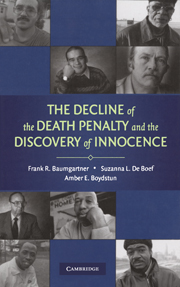Book contents
- Frontmatter
- Contents
- List of Tables
- List of Figures
- Acknowledgments
- 1 Innocence and the Death Penalty Debate
- 2 The Death Penalty in America
- 3 A Chronology of Innocence
- 4 The Shifting Terms of Debate
- 5 Innocence, Resonance, and Old Arguments Made New Again
- 6 Public Opinion
- 7 The Rise and Fall of a Public Policy
- 8 Conclusion
- Epilogue: Individuals Exonerated from Death Row
- Appendix A New York Times capital punishment coverage, 1960 to 2005
- Appendix B Description of Data
- Notes
- References
- Index
4 - The Shifting Terms of Debate
Published online by Cambridge University Press: 05 September 2012
- Frontmatter
- Contents
- List of Tables
- List of Figures
- Acknowledgments
- 1 Innocence and the Death Penalty Debate
- 2 The Death Penalty in America
- 3 A Chronology of Innocence
- 4 The Shifting Terms of Debate
- 5 Innocence, Resonance, and Old Arguments Made New Again
- 6 Public Opinion
- 7 The Rise and Fall of a Public Policy
- 8 Conclusion
- Epilogue: Individuals Exonerated from Death Row
- Appendix A New York Times capital punishment coverage, 1960 to 2005
- Appendix B Description of Data
- Notes
- References
- Index
Summary
Since the mid-1990S, dramatic shifts have occurred in how Americans discuss the death penalty. Public debate on this topic has never been completely monolithic, of course. Like any complex issue, the death penalty involves multiple dimensions of evaluation – constitutional ramifications, how the penalty is administered, how equal application of the law may be ensured, what crimes merit the death penalty, and what kinds of mitigating circumstances point against it – debate around the death penalty involves all these questions and more. In this and the following chapter, we review in detail the nature of media coverage of the death penalty since 1960. Our evidence demonstrates that the new “innocence” frame is the single most powerful frame and the one with the greatest potential impact ever to enter the debate. We focus in this chapter on explaining our data collection and coding processes and on describing the shifting nature of the debate as reflected in the New York Times. The chapter demonstrates huge changes in how the debate has been constructed and how the topics of attention have shifted over time. We also show that these characteristics are not peculiar to the one newspaper that is our main focus by comparing the Times with ten other news outlets. In the Chapter 5, we assess the strength and power of the innocence frame, comparing it statistically to other powerful frames that have existed and pointing out how many of the individual component arguments that together create the innocence frame are not themselves new to the debate.
- Type
- Chapter
- Information
- The Decline of the Death Penalty and the Discovery of Innocence , pp. 102 - 135Publisher: Cambridge University PressPrint publication year: 2008



